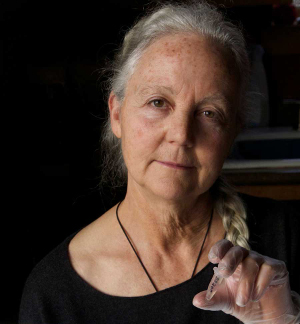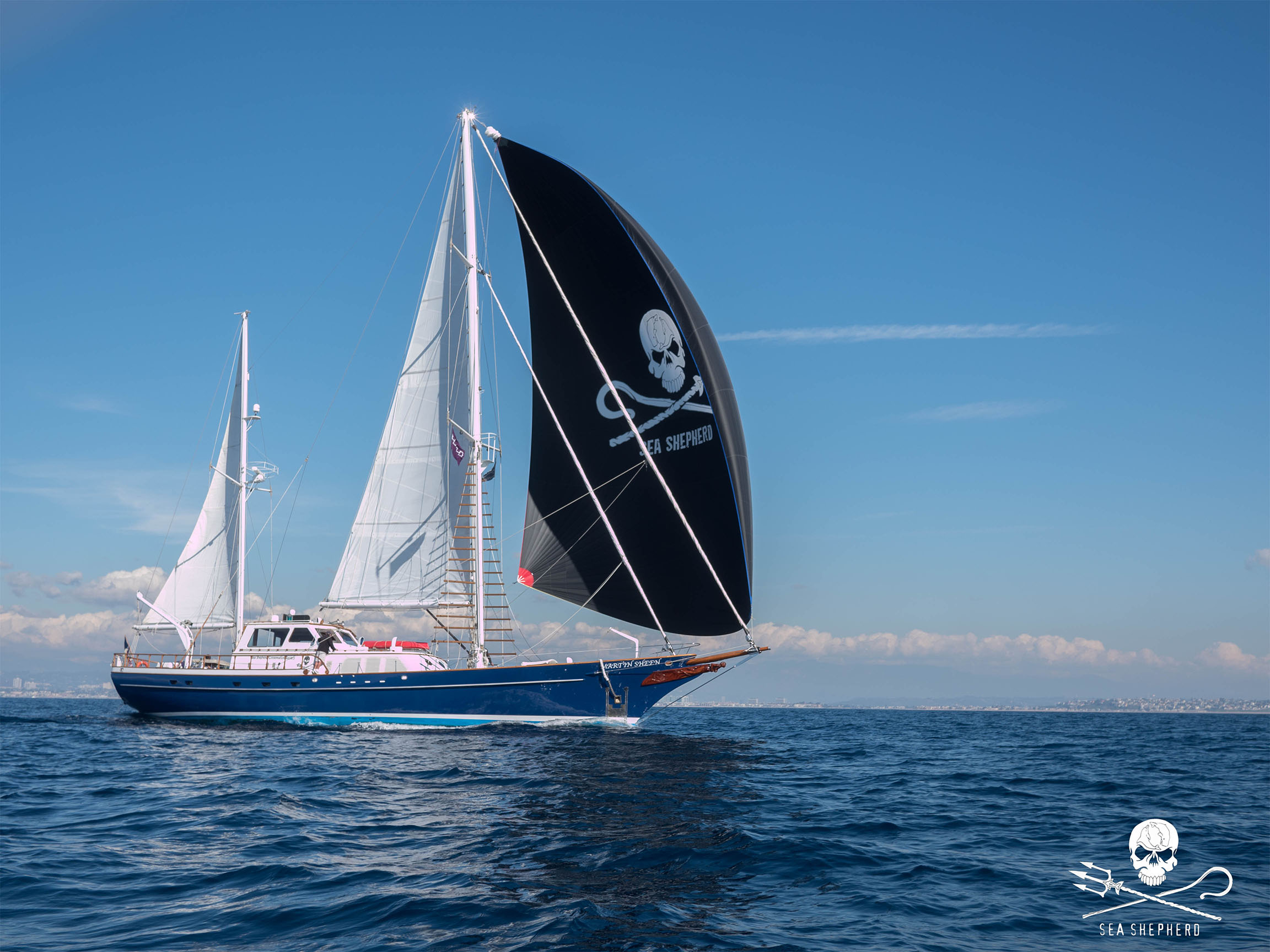
When Alexandra Morton learned that Paul Watson, the combative navigator of the Sea Shepherd Conservation Society, was sending a research vessel to British Columbia to help draw attention to the threat fish farms pose to wild salmon, the 59-year-old biologist was stunned.
The Sea Shepherd Conservation Society has never been bashful or subtle.
To focus attention on the plight of endangered marine species from turtles to tuna, the group, funded by big name celebrities like Martin Sheen, Pamela Anderson and Sean Connery, has employed what it calls “aggressive non-violence.” Sea Shepherd vessels have rammed Japanese whaling boats and pelted Italian fishers with rotten butter as a diversion while divers cut fishing nets holding endangered tuna.
At first Morton didn’t think she was up for that kind of notoriety and asked Watson, whose marine conservation society proudly flies the Jolly Roger – “It takes a pirate to stop a pirate,” famously claims Watson – to remove the society’s online notice of its B.C. plans when they were posted in May.
Morton, who has spent years carefully documenting the scientific impact of fish farms and authoring some 25 papers on the industry’s biological hazards including sea lice and fish viruses, initially thought having the Sea Shepherd Conservation Society as an ally might be “too big a risk for me.”
But then she reconsidered Watson’s plan to put a sleek 24-metre ketch and research vessel named the Martin Sheen and its skilled crew at her disposal for two months and “realized it was an enormous offer.”
Moreover the timing was perfect: the threat of a deadly disease has just been identified on B.C.’s salmon farms.

Earlier this summer federal scientists detected a “potential” Heart and Skeletal Muscle Inflammation (HSMI) in farmed Atlantic salmon samples collected from one B.C. fish farm located on the Johnstone Strait between 2013 and 2014. The costly ailment has plagued Norwegian fish farms.
Scientists said they had no idea how widespread the disease might be or how it might be impacting wild migrating salmon. More studies were needed, they said.
But the piscine reovirus (PRV), a pathogen associated with the HSMI disease, now commonly infects all farmed fish in B.C. and Morton suspects the virus and other pathogens have been taking a heavy toll on migrating wild salmon for years.
Jeremy Dunn of the BC Salmon Farmers Association denies any association between HSMI and the virus but agrees there “are questions that need to be answered” and more research is required.
Prime Minister Justin Trudeau’s new Liberal government has promised a different way of doing things including a public mandate to restore scientific studies and monitoring to protect fish stocks, including sockeye salmon.
But Morton doesn’t think the new government is listening to the science or to growing public concerns about fish farming.
The government has extended corporate fish farm leases from one to six years despite the recent detection of HMSI, now a reportable disease in Norway.
Morton says that’s a reckless decision that defies common sense.
The extension also follows a court decision that ruled the transfer of disease-carrying smolts from hatcheries to fish farms violated federal law. The government planned to appeal that decision until it discovered HSMI disease in farmed fish.
Morton hopes the R/V Martin Sheen will collect more data on the prevalence of piscine reovirus in shellfish on the coast (the filter feeders will identify biological hotspots) and bring a larger international awareness of problems associated with corporate fish farming.
She also hopes to give First Nations an opportunity to express their views on corporate fish farms rearing Atlantic salmon in their territorial waters, including the Broughton Archipelago.
About 100 salmon fish farms now dot the southern B.C. coast. The majority of these ocean feedlots, which rear as many as a million fish in an area the size of four football fields, are owned by the Japanese Mitsibushi Corporation or the Norwegian firms Marine Harvest and Greig.
The industry employs approximately 5,000 people and exports about 68,000 tonnes of farmed Atlantic salmon, mainly to China and the United States.
‘Their reputation precedes them’
Dunn, representing the salmon farmers, expressed alarm about the Sea Shepherd Society and its “Operation Virus Hunter.”
“We are certainly concerned,” Dunn told The Tyee. “Although they have reinforced that they will be ‘non-aggressive and non-harassing’ when approaching farms, their reputation precedes them.”
Dunn said the money being spent on the R/V Martin Sheen expedition, which he called a publicity stunt, should go to the Strategic Salmon Health Initiative, a scientific collaboration between the Department of Fisheries and Oceans, the Pacific Salmon Foundation and Genome British Columbia investigating the health of wild salmon.
“We have a great concern for our salmon and wild salmon and we are obsessed about fish health and learning more about it,” Dunn said.
From support to suspicion
Salmon farming began on the West Coast 30 years ago as small family-run operations but quickly became a source of controversy due to algal blooms, price volatility, Atlantic salmon escapes, the killing of fish predators and bankruptcies.
Morton, a whale specialist, initially supported fish farms and even worked on one, until commercial fishermen raised concerns about the location of fish farms in critical habitat and on migration routes for prawns, salmon and rock cod.
After the DFO answered Morton’s persistent queries about impacts with letters stating “There is no evidence of problem,” the biologist realized the federal agency wasn’t collecting evidence on the impacts of factory farms.
She began to document how exploding sea lice populations at factory farms attack and cripple migrating young wild salmon. She also began to track and identify the impact of diseases spawned in salmon farms and transmitted to wild fish.
“I shouldn’t have to get on a Sea Shepherd vessel and make a scene when governments have a problem,” says Morton. But governments increasingly only heed corporate voices, she says.
In approving long-term leases to fish farms “with no consultation whatsoever, the federal Liberal government has failed act in good faith by not obtaining the free, prior and informed consent of Indigenous peoples,” adds Morton.
She hopes the presence of R/V Martin Sheen in coastal waters from Vancouver to Alert Bay will draw attention to a “failure of democracy.”
Just like cattle feedlots or intensive hog operations on land, industrialized farming of fish like salmon depends upon intensive use of fossil fuels and imported feed.
Crowding of fish also sets the stage for the rapid growth of viruses, bacteria and sea lice. Factory farms also produce high volumes of toxic waste (2.5 to 2.7 kilograms per fish per production cycle) that can seriously degrade coastal water quality.
A waste plume from a fish farm, for example, can extend 30 kilometres into the ocean and can become a biological gauntlet of viruses, bacteria and sea lice for wild migrating fish.
“Four foreign corporations are using our wild Pacific migration routes as their open sewer to raise a foreign species of fish on the territory of First Nations,” said Morton. “It is not a sustainable industry.”
She compares the placement of fish farms on wild fish migration routes to a mother “dragging her children through the infectious disease ward of a hospital on their way to school.”
“And the Trudeau government is allowing them to get bigger,” Morton notes.
Morton and other groups such as the New Brunswick-based Atlantic Salmon Federation have long advocated for closure of open net fish farms and a shift to land-based aquaculture industry using a closed system that can contain its dangerous biological waste.
Such a system could also use alternative feed supplies such as insects as opposed to dwindling and imperilled stocks of small fish.
Morton also says the government should use new technology that can read the immune systems of wild fish to help coastal communities restore wild salmon populations.
If genomic profiling shows that certain kind of pollutants, declining river water levels or deforestation are stressing fish along a particular migration route, “we can go back the next year and fix the problem and see it makes a difference to fish survival,” she says.
All coastal communities would have to participate in a monitoring program with standard protocols to make the system work, explains Morton. “The technology allows the fish to talk to us and then allows us to structurally get out of the way of fish so we don’t have be a bully in the ocean.”
The RV/Martin Sheen will follow wild salmon migration routes along the Fraser River delta up to Discovery Passage and Alert Bay over the next two months.
The BC Salmon Farmers Association said they are open to “meeting with the researchers from the Sea Shepherd Society.” ![]()
Read more: Politics, Environment















Tyee Commenting Guidelines
Comments that violate guidelines risk being deleted, and violations may result in a temporary or permanent user ban. Maintain the spirit of good conversation to stay in the discussion.
*Please note The Tyee is not a forum for spreading misinformation about COVID-19, denying its existence or minimizing its risk to public health.
Do:
Do not: